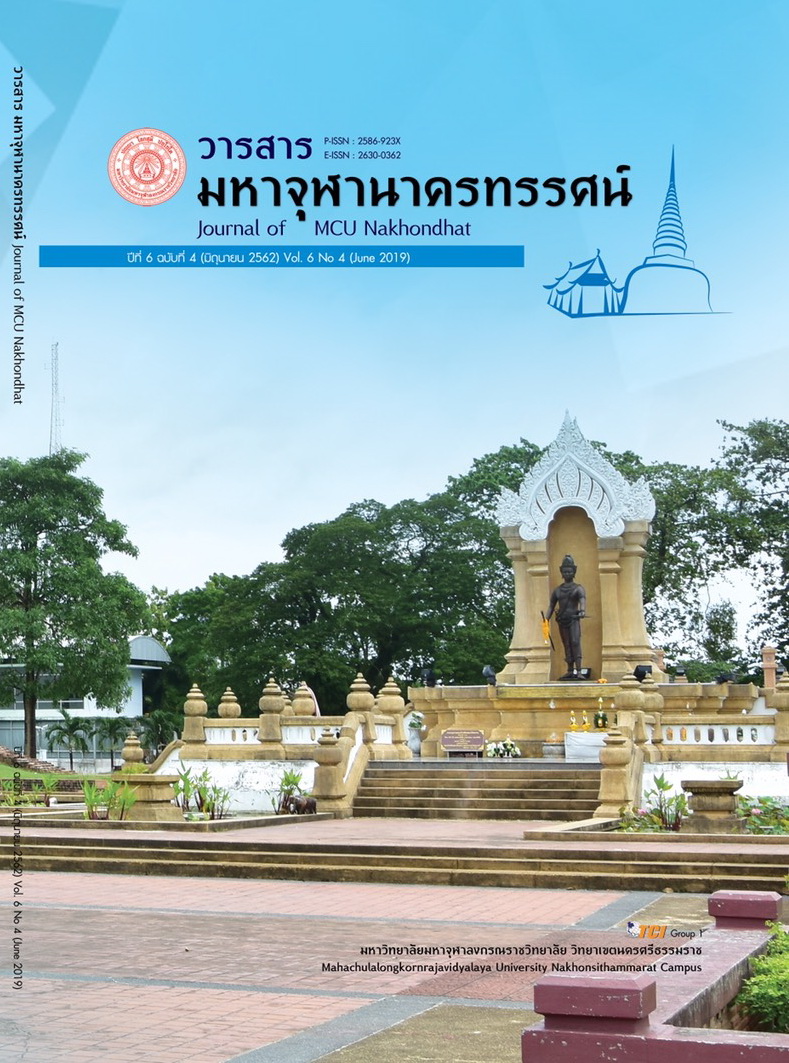LEARNING MANAGEMENT PROCESS FOR CIVILIAN CONSCIOUSNESS CREATION OF HIGHER SECONDARY STUDENTS
Main Article Content
Abstract
Abstract
The objectives of this research were: 1) to study the state of learning management to create citizenship awareness of high school students, 2) to study the principles of creating citizenship consciousness 3) to propose a process to create citizenship consciousness. This research uses a mixed method such as a quantitative research by using the sample of 394 persons, Statistics using percentage, mean, standard deviation and qualitative research by interviewing 10 qualified persons, discussing 10 qualified groups of persons.
The research found that:
- The state of learning management to create citizen consciousness of all 9 high school students with an average value of (4.29), sorted by average from descending order as follows: practical aspect of admirable in citizenship, in citizenship practice planning, in assessing alternatives to citizenship, in the overall evaluation to make pride in citizenship, in assessment during practice in citizenship, in creating various choices in citizenship, in citizenship improvement, in analytical thinking and criticism of citizenship and in awareness of problems and needs of citizenship, respectively.
- Studying the principles of citizenship consciousness, including 1) freedom, 2) respect for rights 3) respect for differences 4) respect for equality principle 5) respect for rules and respect for law 6) social responsibility.
- Propose the process of creating a citizenship consciousness 1) Freedom with activities that promote activities such as fun games (Titanic sail), 2) Respect other people's rights by promoting activities such as relationship creating activities through tales, 3) respect for differences with activities that promote activities such as questions and answers (Pucchavisajjana) on democracy, 4) Respect for equality principle with activities that are promoted, namely, eggs ejected, as a promoting activity, 5) Respect for rules by promoting activities such as democratic puzzle activities, 6) Social responsibility by promoting activities such as democratic art activities.
Article Details
How to Cite
(ภูบังดาว) พ. ป., ศรีวิชัย ส., นันทเพ็ชร ก., & บัวศิริ อ. (2019). LEARNING MANAGEMENT PROCESS FOR CIVILIAN CONSCIOUSNESS CREATION OF HIGHER SECONDARY STUDENTS. Journal of MCU Nakhondhat, 6(4), 2122–2139. retrieved from https://so03.tci-thaijo.org/index.php/JMND/article/view/192306
Section
Research Articles
References
ชลธิชา จิรภัคพงษ์ และคณะ. (2561). ยุทธศาสตร์การเสริมสร้างจิตสำนึกความเป็นพลเมืองดีของเยาวชนบนฐานพุทธธรรมของภาคีการศึกษาและพระสอนศีลธรรม. วารสารมหาวิทยาลัยนครพนม, 8(3), 102-105.
ดวงเดือน พันธุมนาวิน. (2548). การใช้ผลิตผลวิจัยระบบพฤติกรรมศาสตร์ไทยสร้างเครือข่ายพัฒนาเยาวชนบทความประกอบการสัมมนาเรื่องผลิตผลวิจัยระบบพฤติกรรมไทยเร่งไขปัญหาร่วมพัฒนาเยาวชน. ใน รายงานการวิจัย. สำนักงานคณะกรรมการวิจัยแห่งชาติ.
ปลินธร เพ็ชรฤทธิ์. (2550). สภาพและปัญหาการจัดกิจกรรมการเรียนการสอนเพื่อพัฒนาคุณลักษณะความเป็นพลเมืองดีให้แก่นักเรียนมัธยมศึกษาของครูสังคมศึกษา. ใน รายงารการวิจัย. จุฬาลงกรณ์มหาวิทยาลัย.
พระพรหมคุณาภรณ์ (ป.อ.ปยุตฺโต). (2545). ธรรมนูญชีวิต. (พิมพ์ครั้งที่ 46). กรุงเทพมหานคร: โรงพิมพ์กรมศาสนา.
วราภรณ์ ศรีวิโรจน์. (2557). การพัฒนารูปแบบการเรียนการสอน เรื่องปริมาณสารสัมพันธ์แบบเน้นการบูรณาการการฝึกอบรมกระบวนการสืบเสาะหาความรู้และการเรียนรู้แบบร่วมมือเพื่อส่งเสริมการคิดอย่างมีวิจารณญาณ สำหรับนักเรียนระดับมัธยมศึกษาตอนปลาย ห้องเรียนพิเศษวิทยาศาสตร์. วารสารศึกษาศาสตร์ มหาวิทยาลัยนเรศวร, 16(3), 1-13.
สำนักงานคณะกรรมการการศึกษาขั้นพื้นฐาน. (2561). ข้อมูลพื้นฐานโรงเรียน สังกัดสำนักงานพื้นที่การศึกษามัธยมศึกษาเขต 10 ปีการศึกษา 2561. เรียกใช้เมื่อ 7 มิถุนายน 2561 จาก https://data.bopp-obec.info/emis/school.php?Area_CODE=101710
สุภางค์ จันทวานิช. (2540). วิธีวิจัยเชิงคุณภาพ. กรุงเทพมหานคร: โรงพิมพ์แห่งจุฬาลงกรณ์ราชวิทยาลัย.
สุวิมล ว่องวานิช และนงลักษณ์ วิรัชชัย. (2543). ปัจจัยและกระบวนการที่เอื้อต่อการพัฒนาคุณธรรมระดับบุคคล เพื่อมุ่งความสำเร็จของส่วนรวมของนักศึกษามหาวิทยาลัย : การศึกษาเชิงปริมาณและคุณภาพ. ใน รายงานผลการวิจัย. จุฬาลงกรณ์มหาวิทยาลัย.
หนังสือพิมพ์แนวหน้า. (3 กุมภาพันธ์ 2562). ปฏิรูปการศึกษา 6 ด้าน รูปธรรมความสำเร็จการพัฒนาศักยภาพกำลังคนของประเทศ. เข้าถึงได้จาก https://www.kruthai.info/985
Taro Yamane . (1973). Statistics: An Introductory Analysis.3rdEd. New York: Harper and Row Publications.
ดวงเดือน พันธุมนาวิน. (2548). การใช้ผลิตผลวิจัยระบบพฤติกรรมศาสตร์ไทยสร้างเครือข่ายพัฒนาเยาวชนบทความประกอบการสัมมนาเรื่องผลิตผลวิจัยระบบพฤติกรรมไทยเร่งไขปัญหาร่วมพัฒนาเยาวชน. ใน รายงานการวิจัย. สำนักงานคณะกรรมการวิจัยแห่งชาติ.
ปลินธร เพ็ชรฤทธิ์. (2550). สภาพและปัญหาการจัดกิจกรรมการเรียนการสอนเพื่อพัฒนาคุณลักษณะความเป็นพลเมืองดีให้แก่นักเรียนมัธยมศึกษาของครูสังคมศึกษา. ใน รายงารการวิจัย. จุฬาลงกรณ์มหาวิทยาลัย.
พระพรหมคุณาภรณ์ (ป.อ.ปยุตฺโต). (2545). ธรรมนูญชีวิต. (พิมพ์ครั้งที่ 46). กรุงเทพมหานคร: โรงพิมพ์กรมศาสนา.
วราภรณ์ ศรีวิโรจน์. (2557). การพัฒนารูปแบบการเรียนการสอน เรื่องปริมาณสารสัมพันธ์แบบเน้นการบูรณาการการฝึกอบรมกระบวนการสืบเสาะหาความรู้และการเรียนรู้แบบร่วมมือเพื่อส่งเสริมการคิดอย่างมีวิจารณญาณ สำหรับนักเรียนระดับมัธยมศึกษาตอนปลาย ห้องเรียนพิเศษวิทยาศาสตร์. วารสารศึกษาศาสตร์ มหาวิทยาลัยนเรศวร, 16(3), 1-13.
สำนักงานคณะกรรมการการศึกษาขั้นพื้นฐาน. (2561). ข้อมูลพื้นฐานโรงเรียน สังกัดสำนักงานพื้นที่การศึกษามัธยมศึกษาเขต 10 ปีการศึกษา 2561. เรียกใช้เมื่อ 7 มิถุนายน 2561 จาก https://data.bopp-obec.info/emis/school.php?Area_CODE=101710
สุภางค์ จันทวานิช. (2540). วิธีวิจัยเชิงคุณภาพ. กรุงเทพมหานคร: โรงพิมพ์แห่งจุฬาลงกรณ์ราชวิทยาลัย.
สุวิมล ว่องวานิช และนงลักษณ์ วิรัชชัย. (2543). ปัจจัยและกระบวนการที่เอื้อต่อการพัฒนาคุณธรรมระดับบุคคล เพื่อมุ่งความสำเร็จของส่วนรวมของนักศึกษามหาวิทยาลัย : การศึกษาเชิงปริมาณและคุณภาพ. ใน รายงานผลการวิจัย. จุฬาลงกรณ์มหาวิทยาลัย.
หนังสือพิมพ์แนวหน้า. (3 กุมภาพันธ์ 2562). ปฏิรูปการศึกษา 6 ด้าน รูปธรรมความสำเร็จการพัฒนาศักยภาพกำลังคนของประเทศ. เข้าถึงได้จาก https://www.kruthai.info/985
Taro Yamane . (1973). Statistics: An Introductory Analysis.3rdEd. New York: Harper and Row Publications.


